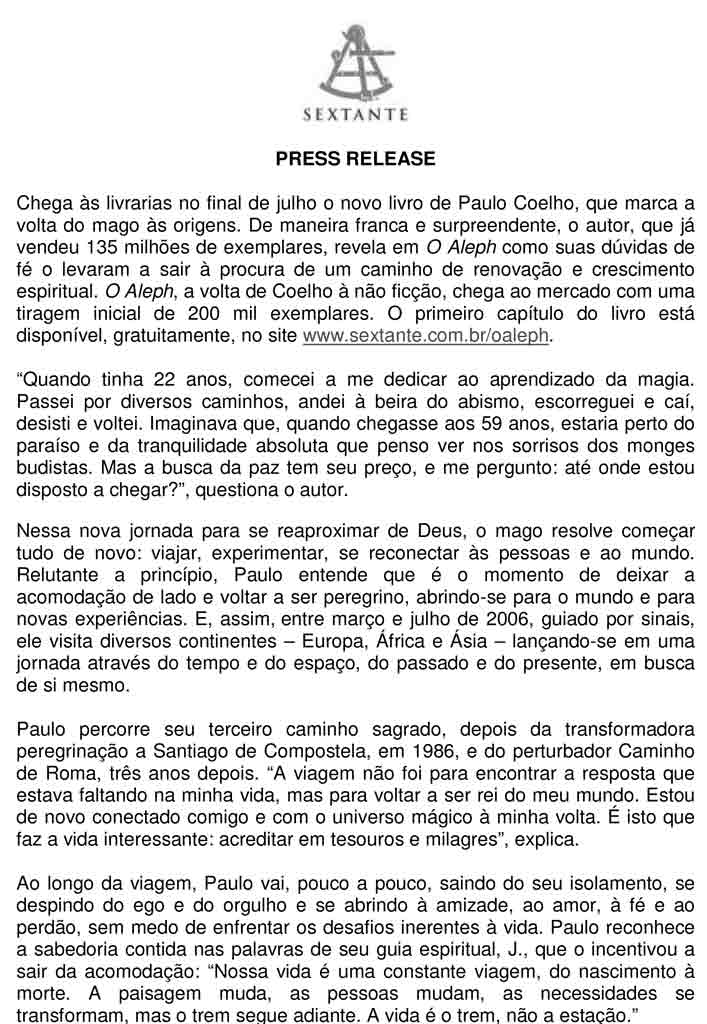

2010 Press release and interview by Sextante Publishers, Brazil, about the book Aleph.
Faith is not something static, but a constant dynamic. A famous German mystic has said that he was often very faithful before crossing a street, and when he reached the other sidewalk all his devotion was gone. So I wouldn’t call it a crisis, but normal behaviour, with ups and downs. A faith that crystallises loses its meaning and becomes fanaticism. Faith grows when it is fuelled by doubt and inner questioning. God is a verb, God is action – and our contact with him, which we call “faith”, is also part of that action. In other words: my spiritual search goes through a daily questioning, and that is what makes it stronger, even if in certain moments – as in 2006 – this period goes on for a long time.
The fact that I did not feel close to God at certain times never meant that He was not with me all the time. It was just a matter of acknowledging that – something I never doubted. In other words, the human being, with his limitations, creates his fantasies, but the soul of that same human being says: “Okay, enjoy your moment of weakness, but you know it’s silly. God has never abandoned you and will never abandon you. ” Over time, this reality is imposed.
After I wrote The Pilgrimage and made the pilgrimage to Santiago de Compostela, I had the most important revelation in my life: the extraordinary lies in the path of ordinary people. In 1986, I had been believing in “secrets, revelations, etc.” for almost 20 years, and that’s when J., my master, made it very clear: look around, everything that was hidden is revealed. I dedicated a wizard’s diary to my guide, with the following words: “When we started the pilgrimage, I thought I had fulfilled one of the greatest dreams of my youth. You were the wizard Don Juan to me, and I relived the saga of Castañeda in search of the extraordinary. But you bravely resisted all my attempts to make you a hero. This made our relationship very difficult, until I understood that the extraordinary lies in the path of ordinary people. Nowadays, this understanding is what I have most precious in my life, it allows me to do anything and it will accompany me forever. ”
The Camino de Santiago was an important movement in the physical space: I started from point A, arrived at point B, and during that trip I found and absorbed everything that was before me. The Road to Rome (1989) was a pilgrimage in time: I had to stay in the same place for 70 days (in this case, Lourdes, France) and, although things did not “happen” as in a normal trip, the fact that I could not moving beyond certain limits forced my soul to see the same things differently. The Jerusalem Way (which included the Trans-Siberian, where I tried to synthesise all the experience acquired there) made me move not only in physical space, but also in time (bringing the past to the present and taking the present to the past). I never imagined that I could write about it, but after four years of maturing the idea, and knowing that the best way I can consolidate my experiences is through writing, I finally got it.
It is much more difficult to write non-fiction, because the author has no choice but to publicly expose his soul. This is not always pleasant, but it is necessary. As Jesus said, “the truth will set you free”.
It is very difficult to summarise this in one sentence. But I would say that Aleph is.
I have been married to the same woman for 30 years, and it gives me a lot more peace of mind to face this type of situation. The age factor also counts: love requires a passionate and mature relationship, which I have today with Christina. Hilal, when I met her, was 21 years old (although she looked older). We talked by e-mail recently: she sensed that I was writing about our experience and we got back in touch. I did not ask about her affective life, but I am sure it is only a matter of time before she finds the person God has placed in her life.

 Back To Top
Back To Top